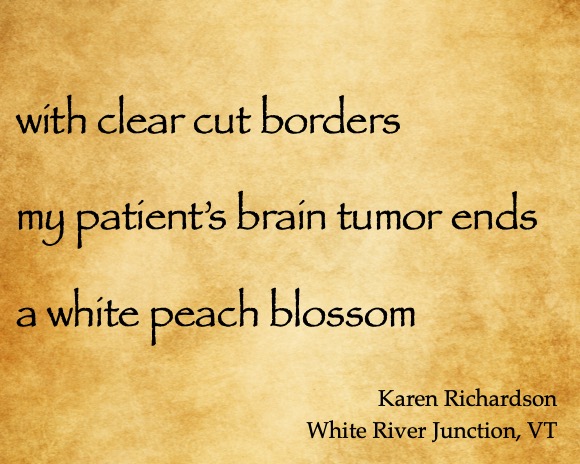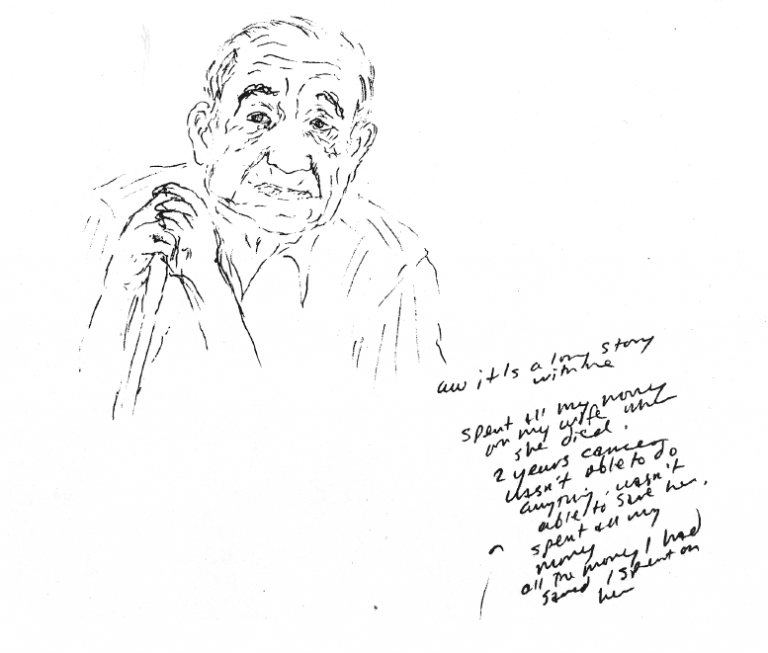
- Home
- /
- cancer
- /
- Page 9
Tag: cancer


A Last Mother’s Day
Terry Hourigan
About the artist:
“I’m a father, nurse, writer and humor lover. After my mom’s death in 1983, I became a hospice volunteer and then decided to go into medical service, leaving a photo career to do so. I went briefly into the NYC emergency medical service, then attended nursing school and went into AIDS and cancer home care and hospice work. It’s been twenty years now, interrupted in 2011 by colon cancer; the chemo rooms gave me some ‘no escape’ time in which I found that I could write.”
About the artwork:
Read More »
No Prospect
His uneasy truce with cancer
was shattered by
the seizure,
awakening confused
in a side-railed bed.
He lies quiet, astonished
by the speed of change,
still hearing echoes of
his home.
I sit silently by his side
as he reads the ceiling tiles,
the monitors,

Collateral Damage
Brenda Scearcy
Dr. Robert’s office felt right to me, with a musical birdsong soundtrack, soft lighting and fresh green tea, and I had my best friend in tow: piece of cake. In this serene atmosphere, I was sure that I’d find out what to do next to finish treating my endometrial cancer.
It’s probably gone now, since my hysterectomy two weeks back, I thought. But let’s play it safe; he’s the gynecological-cancer guru.
Like a general gearing up for combat, Dr. Robert said, “We can beat this. We’ll do a second surgery to remove lymph nodes and omentum–robotically, of course, so your recovery time will be quick. Down the road we’ll definitely do radiation and chemo, and your odds of recurrence will go way down.”

Long Story
Alan Blum
About the artist:
Alan Blum is a Professor and Gerald Leon Wallace MD Endowed Chair in Family Medicine at the University of Alabama School of Medicine in Tuscaloosa. A self-taught artist, he has published three books of his sketches and stories of patients, and his artworks have appeared in more than a dozen medical journals and textbooks. He is a frequent guest speaker at medical schools in courses in the humanities.
About the artwork:
“Aw it’s a long story with me. Spent all my money on my wife when she died. 2 years cancer. Wasn’t able to do anything. Wasn’t able to save her. Spent all my money. All the money I had I
The Pros and Cons of Living with a Terminal Illness
Ellen Diamond
Before I retired in 2000, I worked in a state agency as a peer counselor, or more formally, an employee assistance program (EAP) coordinator. The “coordinator” part was there because my job description wasn’t actually to do counseling; it was to assess the problem and refer the client for help.
But of course both of those processes involved counseling. We just couldn’t call it that.
In 1986, shortly after I’d begun the job, I was separately visited by two employees with HIV/AIDS. Treatments such as the antiviral drugs used so successfully today were nearly a decade away, and a diagnosis of HIV meant almost certain death. These clients were understandably upset and frightened, but they each made it clear to me that they
Cover-up
Carol Scott-Conner
“The plastic surgeons tell me that women who like to swim do much better with reconstruction than with prostheses,” says a young breast surgeon at our weekly Breast Cancer Tumor Board, the working conference where we discuss every new breast cancer patient before starting treatment.
There’s a slight note of surprise in her voice; to her, it’s simply another consideration when advising women before mastectomy.
For decades, the only option after a mastectomy was a prosthesis, or breast form–something shaped and weighted to fill the empty cup of the brassiere and lie, more or less comfortably, against the chest wall. I sometimes tell my patients that using a prosthesis is a bit like going back to the days when we were little girls,

Secret Admirer
Kristen Nace
You will never see my face or know my name. You probably won’t give much thought to what happens to your blood after your doctor says, “I think we need to run some tests,” and the phlebotomist draws it into the tubes with their colored tops. I know I never did, until I became a medical laboratory technologist.
Over the course of a normal day at the hospital lab, my coworkers and I process hundreds of patient specimens–everything from blood to bone, from sputum to spinal fluid. Twenty-four hours a day, 365 days a year, the specimens come to us from the hospital’s ER and ICU, from doctor’s offices and nursing homes, from the inpatients on the floors above us and from outpatients

Be Lucky
Kenneth Zeitler
In 1996, visiting a mall during an out-of-town trip, I suddenly felt dizzy while descending on the escalator. The sensation rapidly resolved, but to be on the safe side, I went to a local emergency room. My evaluation included a CT scan of my head; the results, I was told, were “normal.”
Shortly after returning home I received another call. The CT results were not normal, and I should see a neurologist to have an MRI scan.
I panicked, as anyone would, but I had more reason than most: I’m a medical oncologist. I knew the implications of this news, and they were mostly quite dire.
The MRI revealed a brain tumor, likely “low grade.” I found this a bit reassuring–but still, it
